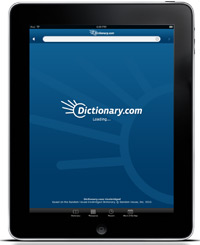In the past, we’ve let you know when words inspired by modern tech or internet culture become part of official dictionaries. No matter how you feel about the internet’s effect on language (it’s bastardization!), you have to admit that it’s kind of interesting when the Oxford Dictionaries add ZOMG or NSFW to the list, or Merriam-Webster adds “sexting” to its dictionary.
Last week, the Oxford Dictionaries Online crowned “GIF” as the word of the year.
Today, we bring you something slightly different. Today, one of the most popular online dictionaries makes its choice for the word of the year – but it’s not a word from the internet. In fact, Dictionary.com‘s top word of 2012 is hundreds of years old.
According to the site, they think the word “bluster” “best conveys the dominant trends of 2012. Why “bluster?” Well, according to their blog, it has everything to do with the most powerful news events of the past several months.
“To be frank, this year has been lexicographically quiet. There were no Arab Springs or Occupies, and few unusual words took on new or heightened meanings because of contemporary events. Where were the tebowing and pinking of 2012? Perhaps we were too distracted by serious political events to go around making up words. Surprisingly, the campaigns themselves weren’t fodder for prickly neologisms either.
2012 saw the most expensive political campaigns and some of the most extreme weather events in human history, from floods in Australia to cyclones in China to Hurricane Sandy and many others. Man-made disasters spiraled as the European Central Bank continued to hem and haw over bailouts and austerity, and Greeks went to the polls after years of uncertainty. Even after many spilled words, the stability of the Euro fuels debate around the world. So what one word conveys these dominant trends of 2012? Bluster,” they write.
Bluster, of course, can be used as a verb to mean “to roar and be tumultuous, as wind.” It can also be used to as a verb meaning “to be loud, noisy, or swaggering.” As a noun, “bluster” can simply mean “noise and violence” or “empty threats of protests.” When you think back on the aforementioned events, it really does make a lot of sense.
Do you think “bluster” accurately describes the global events of 2012?
 "This means that they’ll be able to access the information they need in the exact moment and place when it is most relevant, which in turn not only aids tremendously in knowledge retention, but also enriches the experience of using the App – whether it be a game, reading device, digital learning platform, or literally any other application that utilizes words," adds Goli.
"This means that they’ll be able to access the information they need in the exact moment and place when it is most relevant, which in turn not only aids tremendously in knowledge retention, but also enriches the experience of using the App – whether it be a game, reading device, digital learning platform, or literally any other application that utilizes words," adds Goli.  He says their iPad app already gets a higher level of engagement from users in terms of time spent with the app. Over 40% of users, he says, are coming back 2-5 times a day. User engagement is 2x-to-3x more than the online site, and time spent and usage frequency is also 2x-to-3x more than the online site. It’s worth noting as well, that the site has games that are not even available through Dictionary.com’s regular apps (though a couple of them have their own apps in Apple’s App Store).
He says their iPad app already gets a higher level of engagement from users in terms of time spent with the app. Over 40% of users, he says, are coming back 2-5 times a day. User engagement is 2x-to-3x more than the online site, and time spent and usage frequency is also 2x-to-3x more than the online site. It’s worth noting as well, that the site has games that are not even available through Dictionary.com’s regular apps (though a couple of them have their own apps in Apple’s App Store).  the iPad. This is at the beginning of its lifecycle, Goli says. "We look at it as something that’s going to explode." And Dictionary.com will continue to look for ways to take advantage.
the iPad. This is at the beginning of its lifecycle, Goli says. "We look at it as something that’s going to explode." And Dictionary.com will continue to look for ways to take advantage.